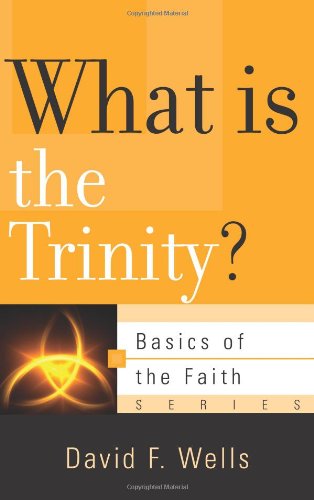A Brief “Bonus” Book Summary from Books At a Glance
Editor’s Note: On several occasions here we have expressed our enthusiasm for P&R’s excellent Basics of the Faith series – brief books (booklets) on big themes by reliable authors. Big truths in bite-size pieces. It’s really a great idea, and P&R has pulled it off well.
Today we feature David Wells’ booklet, What is the Trinity? as a bonus summary for our members.
If the Christian faith were merely the invention of human minds, then surely there would be no doctrine of the Trinity! There is nothing even remotely like it in any other religion. It is a doctrine that the church holds out of necessity as it seeks to comprehend and express the truth of God as he has revealed himself to us. And though this doctrine is so central to all that is Christian, it is not a doctrine that is expounded, as such, in any given verse of Scripture. It is a doctrine that must be constructed from many biblical passages 1) because of its complexity, and 2) because it was not revealed all at once but gradually over redemptive history. The revelation of God as one yet tri-personal culminates in the incarnation and Pentecost: in the words of Warfield, “Jesus Christ and the Holy Spirit are the fundamental proof of the Trinity.” It was left to the church only to receive this revelation and then to learn to state it with precision and clarity.
God is One
God revealed himself to Israel as the creator of all that is, and he demanded of them a corresponding exclusive loyalty. All the nations around Israel acknowledged multiple gods, but Israel was called to recognize that Yahweh as the creator, the one who is distinct from and who rules above all else. The prophets emphasized monotheism – that Yahweh alone is God and continued to call Israel to exclusive loyalty to him. Nothing of this changes when we come to the New Testament but is re-emphasized repeatedly.
Even before New Testament times the rabbis often puzzled how to understand those Old Testament passages that reflect multiple persons within this one God – the plural pronouns (“Let us make man in our image”), the angel of the Lord who is himself recognized as divine and yet distinct from God, and so on. Looking back from the later Christian perspective the early church theologians and on through to the Reformers and beyond, it has been customary to see in these passages a pre-incarnate appearance of God the Son. Indeed, Jesus himself makes one such connection with regard to Isaiah’s vision (Jn. 12:41). Clear as this connection may seem to us, after our Lord’s incarnation, it was virtually impossible to discern beforehand. “It was the incarnation that made inescapable what had, of course, been there from all eternity but was only hinted at in the earlier biblical record: God is one in being but also tripersonal” (p.13).
What is perhaps first striking when we read the Gospels is Christ’s announcement that with him the Kingdom of God – God’s grand, climactic self-revelation – has dawned. This is significant, for it is only. . . .
[To continue reading this summary, please see below....]
The remainder of this article is premium content. Become a member to continue reading.
Already have an account? Sign In
Buy the books

What Is the Trinity?